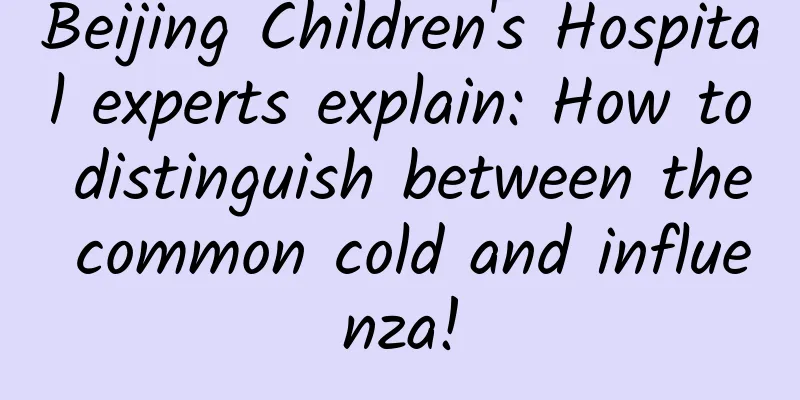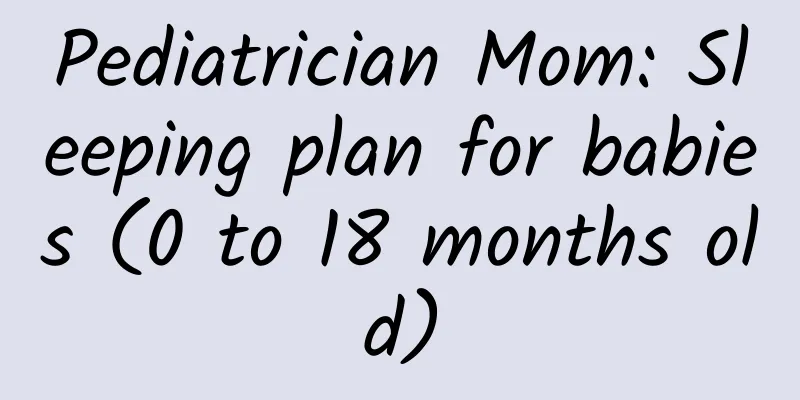Beijing Children's Hospital experts explain: How to distinguish between the common cold and influenza!

|
Author: Wang Quan, Director of the Department of Critical Care Medicine, Beijing Children's Hospital, National Children's Medical Center, and Zhao Guangyuan, Deputy Chief Physician of the Department of Emergency Medicine Respiratory diseases are common in children in winter, and influenza virus is one of the common pathogens. How to distinguish influenza from the common cold? What are the typical symptoms of influenza? How long is the general course of the disease? Which children are at higher risk of developing severe illness? Wang Quan, director of the Department of Critical Care Medicine at Beijing Children's Hospital, National Children's Medical Center, and Zhao Guangyuan, deputy chief physician of the Department of Emergency Medicine, provide authoritative answers to the questions that parents and friends are most concerned about. 1. What are the typical symptoms of influenza? Influenza, or "flu" for short, is an acute respiratory infectious disease caused by influenza virus, which is highly contagious and spreads quickly. Influenza virus is divided into four types: A, B, C, and D, with A and B being the main types. When children are infected with influenza virus, they may experience fever, chills, headache, myalgia and general malaise, often accompanied by respiratory symptoms such as cough, sore throat and runny nose. Young children may have more severe fever, and some children may also have febrile convulsions; in addition, they may have more gastrointestinal symptoms, such as nausea, vomiting, diarrhea and poor appetite. A very small number of children infected with influenza may develop severe influenza, causing laryngitis, pneumonia, encephalopathy, myocarditis, etc. 2. How long does influenza usually last? How does the course of the disease change? For children without underlying diseases, influenza virus infection presents an acute, self-limiting course. Most symptoms disappear within 2-3 days of onset. The fever of some children may last up to 5 days. Most patients recover within 1 week, but the cough may persist for a long time. In a few older children (over seven or eight years old), fatigue and weakness may persist for several weeks. 3. How to distinguish influenza from the common cold? Flu and the common cold are similar, but they should not be confused. The main differences are as follows: Illustration/ Differences between influenza and the common cold During the influenza epidemic season, children with influenza-like symptoms, especially those with a history of contact with influenza patients, should first be considered to have influenza virus infection, and influenza virus antigen testing or nucleic acid testing can help clarify the diagnosis. 4. How is influenza generally treated? After being infected with the influenza virus, treatment measures include antiviral and symptomatic treatment. Anti-influenza drugs: Currently, the anti-influenza drugs available for children include neuraminidase inhibitors (oseltamivir, peramivir, etc.) and RNA polymerase inhibitors (mabaloxavir). Once you have influenza, the sooner you take anti-influenza drugs, the better, especially within 48 hours of onset. However, even if the course of the disease exceeds 48 hours, once influenza is confirmed, you should actively take the drugs. Symptomatic treatment measures: mainly to reduce fever and relieve discomfort. You can choose antipyretics scientifically, and you can also use some drugs to relieve symptoms such as cough and nasal congestion. When using compound preparations, read the instructions carefully to understand whether the drug ingredients overlap with other therapeutic drugs to avoid excessive dosage of a certain ingredient and cause adverse reactions in children. 5. Is there any specific medicine for influenza? Can it be prevented by medicine? Oseltamivir, Mabaloxavir, etc. are antiviral drugs specifically targeting influenza viruses, which can shorten the duration of clinical symptoms. However, it is not recommended that children take these drugs immediately after fever, because there are many respiratory pathogens that cause fever, and these drugs are only effective against influenza. The best way to prevent influenza virus is to actively get vaccinated. If there are no contraindications, people over 6 months old are recommended to actively get the influenza vaccine. For children who are at high risk of severe influenza or influenza complications, have contraindications to influenza vaccines, or have not received the influenza vaccine (or have been vaccinated within 2 weeks), drug prevention should be considered. Drug prevention can reduce but not eliminate the risk of influenza, and susceptibility to influenza will resume after stopping the drug for a period of time. Therefore, routine drug prevention for children is not recommended. 6. Are antibacterial drugs such as azithromycin useful for influenza? Antibacterial drugs, including azithromycin, are ineffective against influenza virus infections. However, if a mixed infection of influenza virus and bacteria or mycoplasma occurs, doctors may consider using anti-influenza virus drugs and antibiotics in combination. 7. Fever is one of the typical symptoms of children. What misunderstandings should be avoided in home care? The main purpose of giving children antipyretics is not to lower their body temperature to normal, but to increase their comfort while lowering their temperature to a certain extent, so that they can go through the fever period comfortably and safely. First of all, you cannot take two antipyretic drugs at the same time, as this will increase the burden on the child's liver and kidneys and cause adverse reactions. It is also not recommended to use two antipyretic drugs alternately, because it will not increase the antipyretic effect, but may mess up the time and even lead to drug overdose. Secondly, when parents choose antipyretic drugs for their children, they should not only choose age-appropriate drugs, but also read the instructions carefully and give them to their children in strict accordance with the requirements of the instructions, paying attention to the dosage and time interval. Remember not to increase the dosage or frequency of administration at will just because the child's temperature has not returned to normal. Finally, if you give your child a compound cold preparation at the same time, be sure to read the drug ingredient list to avoid duplication of ingredients with other drugs currently being used, such as antipyretics. If there is duplication, please use it with caution to avoid overdose. In daily life, children should maintain a regular schedule and get enough sleep. In terms of diet, they should pay attention to nutrition, eat a balanced diet, eat more vegetables and fruits, and drink more water. At the same time, avoid the home environment being too dry and ensure humidity, which is conducive to the recovery of children. Parents should also pay attention to not covering the child with heat after the child has a fever, nor let the child get cold again. Parents should maintain a calm attitude, pay attention to the child's fever, but not be overly anxious, carefully observe the child's condition, and help the child recover as soon as possible. 8. What should I do if I have a high fever convulsion? If a child has a febrile seizure, parents must remain calm and not panic: (1) Let the child lie on his side or tilt his head to one side, clear away sharp objects around him, and ensure that the child is not hurt during a seizure. (2) During a seizure, do not put anything in the child's mouth, do not feed anything, and do not try to stop the seizure by pressing on the limbs. (3) Record the duration and characteristics of the seizure. If the seizure lasts for more than 5 minutes or there has been a history of status convulsus, call an ambulance. In most cases, a febrile seizure will stop within 5 minutes. 9. In what situations do you need to seek medical attention immediately? Most children with influenza have mild symptoms and can be cared for at home, but they should seek medical attention promptly if the following situations occur: Children who have been diagnosed with influenza have extremely high fever, persistent high fever or fever for more than three days, poor spirits or even impaired consciousness, shortness of breath/difficulty breathing, chest pain, chest tightness, fatigue, bluish lips, poor complexion, frequent vomiting or diarrhea, convulsions, refusal to eat, less urine or red urine, obvious muscle pain; or if symptoms recur, such as fever again after influenza symptoms have eased, they need to seek medical attention promptly to avoid worsening of the condition or even danger. 10. Which children are at high risk of severe influenza? Children at high risk of severe influenza include those under 5 years old, especially those under 2 years old; those with underlying diseases, such as asthma, tumors, kidney disease, immunodeficiency, and those taking immunosuppressive drugs; and obese children are also at high risk. When high-risk people develop fever during the influenza season, they should pay close attention and seek medical attention as soon as possible. If influenza virus infection is suspected, antiviral treatment should be started as soon as possible. If there are no contraindications, people at high risk of severe influenza should actively get vaccinated before the start of the influenza season. 11. Will children have sequelae after influenza? Most children will not have sequelae after being infected with influenza. However, after the body temperature returns to normal, cough and runny nose may continue for a week or even longer. Treatment is still symptomatic, keeping the air moist and promoting airway recovery. If the cough seriously affects rest, some antitussive drugs can be taken under the guidance of a doctor. Some children may have a long-term cough due to airway hyperreactivity, especially those with a history of eczema and wheezing. They can be given drug treatment under the guidance of a doctor. 12. How to prevent the spread of influenza in schools and families? Before the start of the flu season, schools should organize and mobilize students and faculty to receive influenza vaccinations; strengthen health education for students and their families, help and urge students to develop good hygiene habits, such as washing hands frequently and maintaining a clean environment; classrooms should be ventilated regularly; schools should conduct temperature monitoring of students and promptly identify sick children; once students are infected with the influenza virus, they should rest at home and not go to school while sick; attach importance to students' physical exercise to enhance their physical fitness and disease resistance. Children who have the flu should stay at home to get enough rest, have a balanced diet, drink plenty of water, and eat easily digestible food; family members should maintain good hygiene habits, pay attention to environmental hygiene, and pay attention to coughing etiquette. If conditions permit, they should try to isolate themselves from sick family members; if isolation is not possible, they should wear masks for protection. In addition, open windows regularly for ventilation, but in winter, you should also keep warm and avoid catching cold. |
Recommend
What are the eight techniques for promoting lactation?
Breastfeeding is undoubtedly the best for the bab...
What is the nutritional value of chicken breast? Why should you eat chicken breast during weight loss?
Chicken breast has a high protein content, which ...
The efficacy and function of human placental tissue fluid
The placenta is the place where the fetus develop...
How to care for vaginal itching in pregnant women
Vaginal itching in postpartum women is a common p...
Foods to replenish blood and qi for women
What are some ways for women to replenish blood a...
Can pregnant women wear silver bracelets?
In fact, many pregnant women are still fond of ce...
What are the causes of pain in the right lower abdomen of women?
There are many reasons why women experience pain ...
My period didn't come and I felt severe back pain
Some girls will experience delayed or early menst...
The discharge is bloody but not bleeding
We all know that women are very susceptible to in...
What juice is best to make with avocado? Do you need to add water to avocado juice?
Avocado is a fruit with high nutritional value. I...
Recently, we must be vigilant about this "disease"!
The 2024 college entrance examination is over, an...
My girlfriend wanted to vomit after sex
I had sex a few days ago and the time was too sho...
What is an ovarian tumor?
Ovarian tumor is a tumor disease with a very high...
What does the egg look like when it is released?
Mature women will ovulate every month. During the...
When is the ovulation period if my period comes on the 25th?
If women want to get pregnant successfully, they ...









